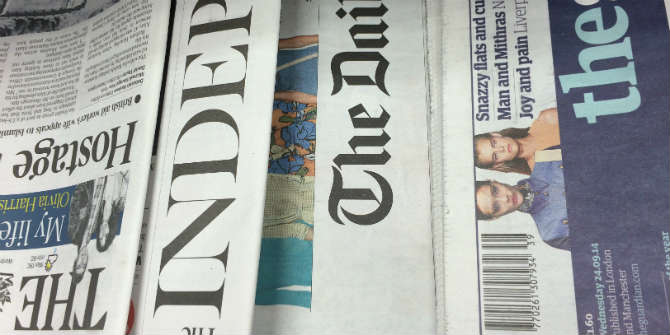 The three main UK political parties – the Conservatives, the Liberal Democrats and Labour – have set out their policy priorities for the media & telecoms sectors in their party manifestos. A recent report from Enders Analysis highlights areas of convergence and divergence between them in different areas of TMT policy. Although there will be considerable policy continuity from one government to the next in some areas there are many important areas of disagreement between the parties, Enders writes, such as on the future direction of the BBC. Here is an extract from the report, laying out the different positions on Charter renewal and the Licence Fee.
The three main UK political parties – the Conservatives, the Liberal Democrats and Labour – have set out their policy priorities for the media & telecoms sectors in their party manifestos. A recent report from Enders Analysis highlights areas of convergence and divergence between them in different areas of TMT policy. Although there will be considerable policy continuity from one government to the next in some areas there are many important areas of disagreement between the parties, Enders writes, such as on the future direction of the BBC. Here is an extract from the report, laying out the different positions on Charter renewal and the Licence Fee.
Arguably the biggest broadcasting issue in this election is the renewal of the BBC’s Royal Charter, not least because the commercial PSB licences have already been renewed for a 10-year period to 2025. The BBC’s current 10-year Charter, the constitutional basis for the BBC and the document that outlines the BBC’s public purpose (among other things), expires on 31 December 2016 and renewal negotiations will need to be over by then. Previous talks have typically lasted up to 3 years, but this time round they will need to be completed in 18 months. If there is no clear outcome to the election, the government may fall back on the Culture, Media and Sport Committee’s (CMSC) recommendation to give the BBC a short, supplementary Charter. This extension will allow a full review to take place in good time.
Forthcoming conversations will focus on three themes: the purpose of the BBC, BBC governance and the Licence Fee. The BBC’s core purpose will likely remain unchanged, but the current governance structure has been called into question following a series of missteps and a general feeling of dissatisfaction towards the BBC Trust.
Though the Licence Fee is usually discussed separately from Charter Renewal, the fact that the current settlement expires in March 2017 means the two negotiations will be running in parallel. Licence Fee negotiations will focus on four key issues:
- As the number of TV homes is in decline as viewing slowly moves online, a number of groups have argued that the Licence Fee is no longer fit for purpose
- The level of payment has long been a subject of discussion, particularly as the Licence Fee has been frozen since 2010
- Following calls in the media, Culture Secretary Sajid Javid initiated a review into decriminalisation of non-payment of the licence fee last October
- Related to the second point, there is an issue of what else the BBC should pay for, whether digital switchover, the World Service or super-fast broadband
All of the main political parties reference the BBC in their manifestos, but it is the Conservatives who have made their position clearest, promising to deliver a “comprehensive review of the BBC Royal Charter, ensuring it delivers value for money for the licence fee payer”. They also plan to keep the licence fee frozen (as it has been since 2010), while also introducing further top-slicing to help fund the roll out of superfast broadband. Also, in October 2014, Mr Javid mentioned that he would seriously consider alternative funding methods for the BBC, including subscription payments and a state-owned, commercially funded model akin to Channel 4. Labour, while publicly supporting the call to decriminalise non-payment of the Licence Fee, do not say much in their manifesto on Charter renewal, other than to point out that the BBC “makes a vital contribution to the richness of our cultural life”, and that they will “ensure it continues to do so while delivering value for money”. The Liberal Democrats come out as the most pro-BBC of the three, allowing for the possibility of the Licence Fee rising at the rate of inflation (as a maximum).
Perhaps the aspect we can be surest of is around the BBC’s position in the nations. If – as we suggested in GE 2015 update – Election and government outcomes [2015-034] – the most likely outcome is that Labour form a minority government dependent on the support of the SNP, Plaid Cymru and the Greens, then Scotland and Wales will likely have a far greater say over the future of the BBC. The SNP in particular feel that Scotland has long received a raw deal, and that, were the Licence Fee distributed fairly, Scotland would receive an extra £100 million, providing “important new opportunities for production companies and the creative sector in Scotland”. Plaid Cymru call for a ‘federal BBC’ with a BBC Trust for Wales appointed by the Welsh Assembly.
Playing out in the background is the CMSC’s “Future of the BBC” inquiry, the first step of which was published in February this year. This document highlighted the importance and value of the BBC, as well as the short term suitability of the Licence Fee as a funding mechanism, though it suggests moving towards a German-style household broadcasting levy in the long term. On the issue of governance it suggests replacing the BBC Trust with a unitary board, while increasing the access the National Audit Office has to the BBC’s accounts.
While the Conservative manifesto paints the bleakest picture for the BBC, further reducing income to an organisation already halfway through an extensive cost-cutting programme, a Labour minority government could potentially involve a great deal of change for the broadcaster in Scotland and Wales. Perhaps a hung Parliament, and a delay to Charter renewal discussions, is the best possible outcome for the BBC. We will continue to publish on Charter renewal as it unfolds.
This extract from Enders Analysis’ report on Party positions on media & telecoms for GE2015 is reproduced here with permission and thanks. This post gives the views of the authors and does not represent the position of the LSE Media Policy Project blog, nor of the London School of Economics and Political Science.





